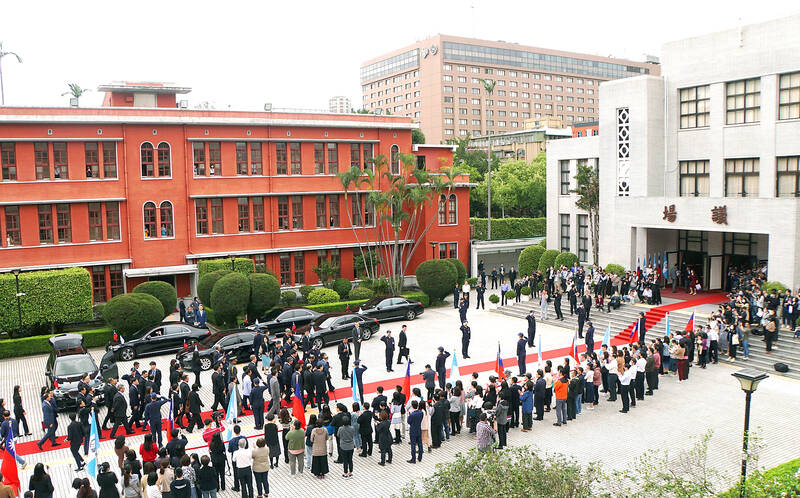The Legislative Yuan yesterday passed a preliminary review of a proposed amendment to the Organic Act of the Legislative Yuan (立法院組織法) which would establish an international affairs office.
If a third reading of the amendment can be completed during the current legislative session, which ends this month, the office could be established as soon as the next session, which is to begin in September, Legislative Yuan Secretary-General Lin Jih-jia (林志嘉) said yesterday.
International affairs are currently handled by the public relations division of the legislature’s Secretariat, which comprises only eight people, he said.

Photo: CNA
That has proved insufficient due to the increasing numbers of delegations visiting Taiwan, Lin said, adding that the legislature sometimes has to enlist the help of the Ministry of Foreign Affairs and business groups.
In the past four years, the legislature each year welcomed more than 250 delegations consisting of more than 3,000 members, which demonstrated the need to establish the office, Democratic Progressive Party Legislator Tang Hui-chen (湯蕙禎) said.
The division has welcomed 691 guests from 55 delegations during the current legislative session, the Secretariat said.
The new office is to have four civil servants in each of four sections, which are to be in charge of parliamentary exchanges, international cooperation, international communication and protocol-related affairs, Lin said.
After the establishment of the office, the public relations division could focus on domestic affairs, he said.
The primary duties of the office would include integrating parliamentary diplomacy tasks, actively fostering friendly relations with the parliaments of other nations, participating in international events and assisting in expanding Taiwan’s diplomatic space, he said.
The office would help deepen Taiwan’s relations with its diplomatic allies and enhance its substantial relationships with other nations, he added.
The personnel costs of the office are estimated to be about NT$33.24 million (US$1.08 million), the legislature’s Budget Center said.
The budget for work related to parliamentary diplomacy, which is to cover the operational costs of the office, is to remain unchanged at NT$22.6 million and can be increased if needed, Lin said.
The legislative caucuses of the DPP, the Chinese Nationalist Party (KMT), the Taiwan People’s Party and the New Power Party all proposed their own versions of the amendment, which are similar, he said.
Separately, regarding discussions of relocating the Legislative Yuan, which have been ongoing for more than 30 years, Lin said that Legislative Speaker You Si-kun (游錫?) is very serious about the plan and it is “not just talk.”
According to a report released in January, proposed new locations have been narrowed down to six — Chiang Kai-shek Memorial Hall Park, the former Air Force Command headquarters, the Taipei Detention Center in Tucheng (土城), the Chenggong Ling (成功嶺) military camp, Yilan County’s Chung Hsing Cultural and Creative Park and a zone near the high-speed rail station in Changhua County.

INVESTIGATION: The case is the latest instance of a DPP figure being implicated in an espionage network accused of allegedly leaking information to Chinese intelligence Democratic Progressive Party (DPP) member Ho Jen-chieh (何仁傑) was detained and held incommunicado yesterday on suspicion of spying for China during his tenure as assistant to then-minister of foreign affairs Joseph Wu (吳釗燮). The Taipei District Prosecutors’ Office said Ho was implicated during its investigation into alleged spying activities by former Presidential Office consultant Wu Shang-yu (吳尚雨). Prosecutors said there is reason to believe Ho breached the National Security Act (國家安全法) by leaking classified Ministry of Foreign Affairs information to Chinese intelligence. Following interrogation, prosecutors petitioned the Taipei District Court to detain Ho, citing concerns over potential collusion or tampering of evidence. The

Seventy percent of middle and elementary schools now conduct English classes entirely in English, the Ministry of Education said, as it encourages schools nationwide to adopt this practice Minister of Education (MOE) Cheng Ying-yao (鄭英耀) is scheduled to present a report on the government’s bilingual education policy to the Legislative Yuan’s Education and Culture Committee today. The report would outline strategies aimed at expanding access to education, reducing regional disparities and improving talent cultivation. Implementation of bilingual education policies has varied across local governments, occasionally drawing public criticism. For example, some schools have required teachers of non-English subjects to pass English proficiency

‘FORM OF PROTEST’: The German Institute Taipei said it was ‘shocked’ to see Nazi symbolism used in connection with political aims as it condemned the incident Sung Chien-liang (宋建樑), who led efforts to recall Democratic Progressive Party (DPP) Legislator Lee Kun-cheng (李坤城), was released on bail of NT$80,000 yesterday amid an outcry over a Nazi armband he wore to questioning the night before. Sung arrived at the New Taipei City District Prosecutors’ Office for questioning in a recall petition forgery case on Tuesday night wearing a red armband bearing a swastika, carrying a copy of Adolf Hitler’s Mein Kampf and giving a Nazi salute. Sung left the building at 1:15am without the armband and apparently covering the book with a coat. This is a serious international scandal and Chinese

NEGOTIATIONS: The US response to the countermeasures and plans Taiwan presented has been positive, including boosting procurement and investment, the president said Taiwan is included in the first group for trade negotiations with the US, President William Lai (賴清德) said yesterday, as he seeks to shield Taiwanese exporters from a 32 percent tariff. In Washington, US Trade Representative Jamieson Greer said in an interview on Fox News on Thursday that he would speak to his Taiwanese and Israeli counterparts yesterday about tariffs after holding a long discussion with the Vietnamese earlier. US President Donald Trump on Wednesday postponed punishing levies on multiple trade partners, including Taiwan, for three months after trillions of US dollars were wiped off global markets. He has maintained a 10 percent